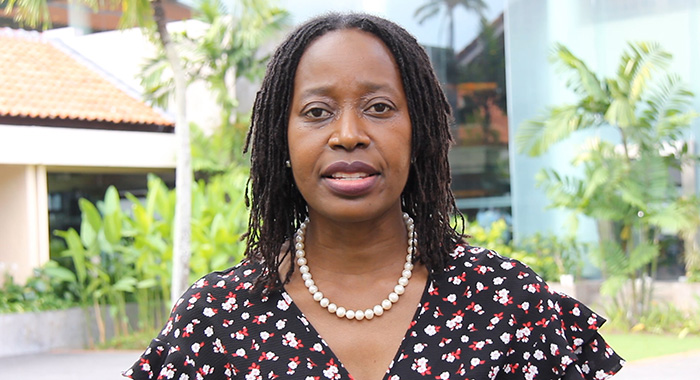By Kenton X. Chance
BALI, Indonesia (CMC) — The executive director of the Barbados-based Caribbean Disaster Emergency Management Agency (CDEMA), Elizabeth Riley, says the coronavirus (COVID-19) pandemic has highlighted the need for a more robust assessment of the risk from the diverse hazards in the region and to get a better understanding of how the whole-of-government approach needs to be applied to address future risks.
“The reality is that a lot of attention was not paid to hazards on the biological side. I think that what the COVID experience has taught us is that we do need to give a lens on the full scope of those hazards that affect and could potentially affect our Caribbean region,” Riley told the Caribbean Media Corporation (CMC) at the Global Platform for Disaster Risk Reduction, taking place here through May 28.
Riley said the principles behind the regional Comprehensive Disaster Management strategy have always emphasised “the need to look at hazards in a very holistic way — looking at all hazards”.
Biological hazards were identified in the original version of the regional Comprehensive Disaster Management strategy prepared in 2000, Riley said, adding that going forward, the whole issue of cyber-type attacks are going to be coming greater to fore.
“It’s an area we haven’t traditionally given a lot of attention to but the CDM (Comprehensive Disaster Management) Strategy does also speak to technological hazards.”
The Global Platform for Disaster Risk Reduction is the main global forum to assess and discuss progress on the implementation of the Sendai Framework for Disaster Risk Reduction.
It is expected to include recommendations of actions for policymakers in the areas of sustainable development, finance and economic planning, disaster risk reduction and international trade, climate and ecosystem actions, and international cooperation.
“This is a very important juncture in the conversation on disaster risk and how we seek to protect lives and also protect livelihoods that affect us. From the Caribbean perspective, it’s an important space for us to bring the specific Caribbean experiences to the table and to ensure that key messages and recommendations from the Caribbean perspective are heard,” Riley said.
The forum is organised and convened by the UN Office for Disaster Risk Reduction (UNDRR) and is hosted by the government of Indonesia and formally opens on Wednesday, following days of preparatory meetings.
Riley spoke at the opening plenary of the regional early warning systems conference where she shared on the status of early warning systems in the Caribbean, looking at some of the systemic challenges that the region continues to face in setting up early warning systems and making sure they are perfect.
Riley demonstrated to the global community the “excellent work that has been done in the Caribbean to move early warning systems forward, including investment in science, better understanding of the seismic risk, expansion of the seismic network and also the excellent work being done by the Caribbean Institute for Meteorology and Hydrology in providing better impact based forecasting for us, as it relate to hydrometeorology hazards”.
CDEMA shared its “very systematic step-wise approach to addressing early warning systems and the work we have done on the early warning systems checklist, applying that in our participating states and getting, really, a good regional synthesis picture of where we are at”.
CDEMA also participated in the opening plenary of the world reconstruction conference and made a number of critical points.
“We spoke about how COVID-19 has impacted conversations on recovery, really shifting the traditional understanding of what recovery is about and recognising that we are discussing how to undertake recovery in a scenario where the hazards are still impacting us.”
Riley noted that COVID-19 has had a heavy impact on CDEMA member countries because of their heavy reliance on tourism.
She cited the Caribbean Development Bank’s indication that the majority of Caribbean states experience a double-digit decline in their gross domestic product (GDP) as a result of the impact of COVID-19.
“So, as we move into the Global Platform, which will take place over the next three days, it is also an important space for further Caribbean representation.”
At the high-level opening plenary on Wednesday, CDEMA will address the status of Caribbean countries regarding the Sendai Framework for Disaster Risk Reduction and why the region is not on track to attain the 2030 targets.
Riley said the region is not on track because of a number of reasons, including a need to get a better understanding of the first target of the Sendai Framework, which speaks to the risk knowledge.
She said the Caribbean has seen increasing complexity with respect to the hazards that it faces.
“And this speak to not only the climate-related hazards and the implications of climate change but, as we saw in the example of St. Vincent and the Grenadines in April 2021, it is also very much linked with the seismic hazards, the biological hazards, as they were experiencing high instances of dengue and COVID-19 delta wave at the same time that the volcano erupted.
“And getting an understanding of the risk in the realities of these very complex scenarios is going to be an important foundational piece to being able to better protect our populations and also to try to ensure that we do not roll back our developmental gains,” Riley told CMC.






